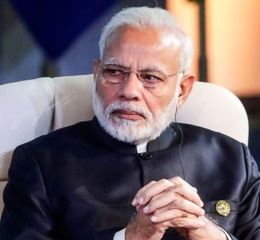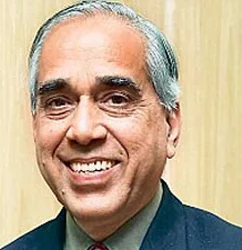
The prime minister of India is the head of government of the Republic of India. Executive authority is vested in the prime minister and their chosen Council of Ministers, despite the president of India being the nominal head of the executive. The prime minister is often the leader of the party or the coalition with a majority in the lower house of the Parliament of India, the Lok Sabha, which is the main legislative body in the Republic of India. The prime minister and their cabinet are at all times responsible to the Lok Sabha.

The National Security Council is a federal institutional and consultative body chaired by the Prime Minister of Pakistan as its chairman. The NSC is a principal forum that is mandated for considering national security and foreign policy matters with the senior national security advisers and Cabinet ministers. The idea and inception of National Security Council was first conceived in 1969 under the President Yahya Khan, its functions were to advise and assist the president and prime minister on national security and foreign policies.
The National Security Council (NSC) of India is an executive government agency tasked with advising the Prime Minister's Office on matters of national security and strategic interest. It was established by the former Prime Minister of India Atal Bihari Vajpayee on 19 November 1998, with Brajesh Mishra as the first National Security Advisor. Prior to the formation of the NSC, these activities were overseen by the Principal Secretary to the preceding Prime Minister.

The National Command Authority is the apex Government-led command to oversee the employment, policy formulation, exercises, deployment, research and development, and operational command and control of Pakistan's nuclear arsenals.

Naresh Chandra was a 1956 batch IAS officer of Rajasthan cadre, who served as the Cabinet Secretary of India, Defence Secretary of India, Home Secretary of India, Water Resources Secretary of India and Indian Ambassador to the United States. He was awarded India's second highest civilian honour, the Padma Vibhushan, for civil service, in 2007.
Central Secretariat Service is the administrative civil service under Group A and Group B of the Central Civil Services of the executive branch of the Government of India. They are governed by Central Secretariat Service Rules of 1962, which has been issued under the powers of Article 309 of the Constitution of India. The service members work under restrictions and rules of Central Civil Services (Conduct) Rules.
The foreign secretary of India is the top diplomat of India and administrative head of the Ministry of External Affairs. This post is held by an Indian foreign service officer of the rank of secretary to the government of India. Vinay Mohan Kwatra is an Indian diplomat and currently serving as the Foreign Secretary of India from May 2022, succeeding Harsh Vardhan Shringla.
The Cabinet Secretary is the top-most executive official and senior-most civil servant of the Government of India. The Cabinet Secretary is the ex-officio head of the Civil Services Board, the Cabinet Secretariat, the Indian Administrative Service (IAS), and all Civil Services of India work under the rules of business of the government.

The Prime Minister's Office (PMO) consists of the immediate staff of the Prime Minister of India, as well as multiple levels of support staff reporting to the Prime Minister. The PMO is headed by the Principal Secretary, currently Pramod Kumar Misra. The PMO was originally called the Prime Minister's Secretariat until 1977, when it was renamed during the Morarji Desai ministry.
The Cabinet Committee on Security (CCS) of the Government of India discusses, debates and is the final decision-making body on senior appointments in the national security apparatus, defence policy and expenditure, and generally all matters of India's national security.
Joint Secretary to Government of India is a post under the Central Staffing Scheme and the third highest non-political executive rank in Government of India. The authority for creation of this post solely rests with Cabinet of India.

The First Ministry of Narendra Modi is the Council of Ministers headed by Narendra Modi that was formed after the 2014 general election which was held in nine phases from 7 April to 12 May in 2014. The results of the election were announced on 16 May 2014 and this led to the formation of the 16th Lok Sabha. The Council assumed office from 27 May 2014.

Nripendra Misra is a retired 1967 Indian Administrative Service (IAS) officer from the Uttar Pradesh cadre who served as Principal Secretary to the Prime Minister of India, Narendra Modi from 2014 to 2019. He has also served as the chairperson of the Telecom Regulatory Authority of India, Telecom Secretary of India and Fertilizers Secretary of India. He was awarded India's third highest civilian award the Padma Bhushan in 2021.
The 7th Central Pay Commission (7CPC), constituted in February 2014 the principles and structure of emoluments of all central government civilian employees including defence forces in India, submitted its report on 19 November 2015. 7CPC's recommendations affects the organization, rank structure, pay, allowances and pension, of 13,86,171 armed forces personnel. This helps A salary monitoring system is designed to determine and suggest needed changes to the salaries of government employees.page 105, para 6.2.2[3]

Secretary to the Government of India, often abbreviated as Secretary, GoI, or simply as Secretary, is a post and a rank under the Central Staffing Scheme of the Government of India. The authority for the creation of this post solely rests with the Union Council of Ministers.

The National Security Committee (NSC), also known as National Security Committee of Cabinet, is the peak decision-making body for national security and major foreign policy matters in the Australian Government. It is a committee of the Cabinet of Australia, though decisions of the NSC do not require the endorsement of the Cabinet itself.

The National Intelligence Coordination Committee (NICC) is a peak intergovernmental officials-level body of the Government of Australia responsible for the development and co-ordination of the Australian Intelligence Community in accordance with the National Security Committee of Cabinet. The NICC is chaired by the Director-General of the Office of National Intelligence.
The Cabinet Committee on Political Affairs of the Central Government of India deals with problems related to Centre-State relations, considers economic and political issues that require a broader perspective, and handles foreign affairs that do not have internal or external security implications. It is also known as 'super cabinet,' as it consists of most of the most important Cabinet ministers.
Additional Secretary is a post and a rank under the Central Staffing Scheme of the Government of India. The authority for creation of this post solely rests with Cabinet of India.

The Integrated Defence Staff (IDS) is an organisation responsible for fostering coordination and enabling prioritisation across the different branches of the Indian Armed Forces. It is composed of representatives from the Indian Army, Indian Navy, Indian Air Force, Ministry of External Affairs, Defence Research and Development Organisation, Ministry of Defence and Ministry of Finance. The IDS is headed by Chief of Integrated Defence Staff along with Deputy Chiefs of Integrated Defence Staff. On December 24, 2019, the Cabinet Committee on Security (CCS) established the post of Chief of Defence Staff, a four-star general, a tri-service Chief, that shall lead the defence forces as well as play the role of head of the Department of Military Affairs. The body advises and assists the Chief of Defence Staff.










